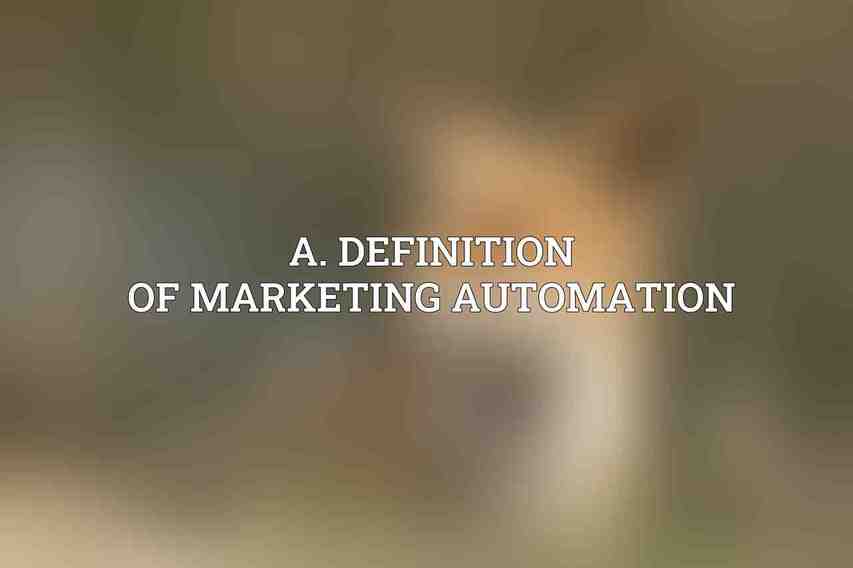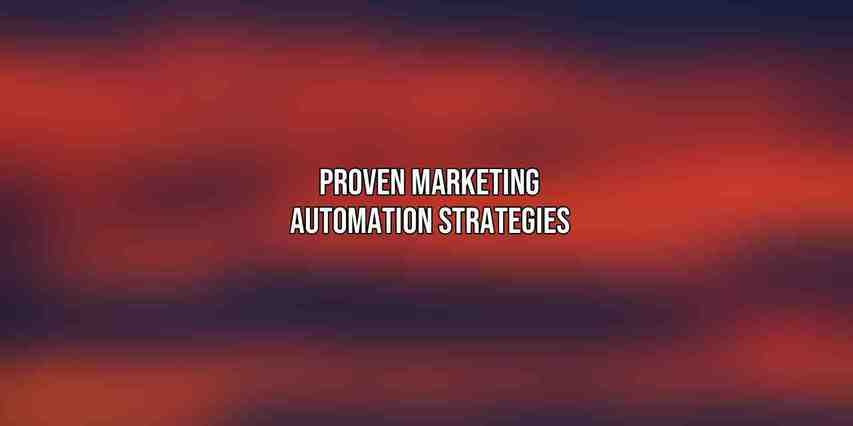Marketing automation is the practice of using software to automate repetitive marketing tasks and processes across multiple channels. By leveraging technology to streamline marketing efforts, businesses can enhance their efficiency, engage with customers on a more personal level, generate more leads, and gain insights into their marketing performance.
A. Definition of Marketing Automation

Streamlining repetitive marketing tasks using software allows businesses to focus on more strategic initiatives and creative endeavors.
Automating processes across multiple channels such as email, social media, and websites ensures consistent messaging and engagement with customers.
B. Benefits of Marketing Automation
Increased efficiency and productivity enable marketing teams to do more with less resources. Dive deeper into Top Digital Marketing Automation Tools of 2024
Enhanced customer engagement and personalization build stronger relationships with the audience.
Improved lead generation and conversion rates result from targeted and timely interactions with prospects.
Measurable results and insights provide valuable data for refining marketing strategies and improving ROI.
Proven Marketing Automation Strategies

Digital marketing automation encompasses various strategies across different channels to optimize customer engagement and drive results.
A. Email Marketing Automation
Segmentation and targeting play a crucial role in delivering relevant content to the right audience.
- Segmenting audiences based on demographics, behavior, etc., allows for personalized campaigns.
- Personalizing email campaigns for each segment increases engagement and conversion rates.
Automated email sequences help nurture leads and guide them through the customer journey.
- Welcome emails, onboarding sequences, and lead nurturing campaigns create a personalized experience.
- Triggered emails based on user actions or events ensure timely and tailored communication.
Email marketing metrics provide insights into campaign performance.
- Monitoring open rates, click-through rates, and conversion rates helps evaluate the effectiveness of campaigns.
- Tracking and analyzing campaign performance inform optimization strategies.
B. Social Media Marketing Automation
Content scheduling and automation streamline social media activities. Dive deeper into In-Depth Reviews of Top Marketing Automation Tools
- Scheduling posts in advance using social media management tools saves time and ensures consistent posting.
- Automating social media interactions like liking and commenting enhances engagement with the audience.
Social media lead generation integrates lead capture forms with social campaigns.
- Automating follow-up messages nurtures leads and moves them through the funnel.
- Social media analytics offer insights into campaign performance, trends, and audience preferences.
Social media analytics help in monitoring social media performance through insights to identify trends and optimize campaigns.
C. Content Marketing Automation
Content creation and distribution benefit from automation.
- Automating blog post publishing and social media sharing saves time and ensures a consistent content schedule.
- Curating and distributing valuable content across channels increases brand visibility.
Content optimization involves using SEO tools to improve search engine rankings.
- Automating content promotion and syndication helps reach a wider audience.
- Analyzing content engagement metrics aids in understanding audience preferences.
Content performance analysis through tracking engagement metrics and analyzing performance helps in identifying areas for improvement.
D. Paid Advertising Automation
Automated bidding and optimization streamline paid advertising management.
- Using machine learning algorithms to adjust bids optimizes campaigns for better performance.
- Automating keyword research and insertion ensures relevance and efficiency in ad delivery.
Retargeting campaigns automate ad delivery to users who have shown interest.
- Personalizing retargeting campaigns improves conversion rates and customer engagement.
- Paid advertising analytics offer insights into campaign performance and help in optimizing strategies.
E. Cross-Channel Marketing Automation
Omnichannel customer experience ensures a seamless journey across multiple touchpoints.
- Integrating channels like email, social media, and websites provides a cohesive brand experience.
- Providing a consistent customer experience increases brand loyalty and engagement.
Cross-channel lead nurturing automatizes interactions with leads across various channels.
- Personalizing communication based on cross-channel data enhances the relevance of messaging.
- Analyzing cross-channel performance helps in optimizing campaigns for better results.
Case Studies
Analyzing real-life examples showcases the effectiveness of marketing automation in different scenarios.
A. Example 1: Ecommerce Company
Marketing automation tool used:HubSpot
Automation strategy: Email marketing, abandoned cart emails, triggered email sequences
Results: Increased email open rates by 30%, reduced abandoned cart rates by 15%, improved website traffic
B. Example 2: Software Company
Marketing automation tool used:Marketo
Automation strategy: Lead scoring, lead nurturing campaigns, automated social media outreach
Results: Increased qualified leads by 40%, shortened sales cycles, improved customer satisfaction
C. Example 3: Non-Profit Organization
Marketing automation tool used:Salesforce Marketing Cloud Check this blog on How to Integrate Marketing Automation Tools
Automation strategy: Donation tracking, automated email appeals, personalized donor communications
Results: Increased donor engagement, improved fundraising efficiency, strengthened donor relationships
Best Practices for Marketing Automation
Implementing best practices is essential for maximizing the benefits of marketing automation.
A. Set clear goals and objectives
Define the desired outcomes and key performance indicators to measure success.
Align marketing automation strategies with business goals to ensure relevance and impact.
B. Integrate with CRM and analytics
Connect the marketing automation platform to the CRM system for a unified view of customer data.
Integrate data analytics tools to track performance and optimize campaigns based on insights.
C. Segment and target your audience
Divide the audience into specific groups based on demographics, behavior, etc., for personalized campaigns.
Tailor marketing messages and campaigns to each segment to increase relevance and engagement.
D. Use triggered campaigns
Automate email sequences based on user actions or events for timely and relevant communication.
Personalize communication and deliver tailored content to engage customers effectively.
E. Measure and optimize
Track key performance indicators regularly to assess campaign effectiveness.
Analyze campaign results, review performance metrics, and make adjustments for continuous improvement.
By implementing these strategies and best practices, businesses can leverage the power of digital marketing automation to enhance customer experiences, drive sales, and achieve their marketing goals more efficiently.
Frequently Asked Questions
What is digital marketing automation?
Digital marketing automation is the use of software tools and technology to streamline and automate marketing tasks, workflows, and processes to increase efficiency and drive better results.
How can digital marketing automation benefit my business?
Digital marketing automation can benefit your business by saving time and resources, improving marketing ROI, enhancing customer relationships through personalized interactions, and increasing lead generation and conversion rates.
What are some proven digital marketing automation strategies?
Proven digital marketing automation strategies include setting up email drip campaigns, retargeting ads, lead scoring and nurturing, social media scheduling, and personalized content recommendations.
How can I measure the success of my digital marketing automation efforts?
You can measure the success of your digital marketing automation efforts by tracking key performance indicators (KPIs) such as conversion rates, lead generation metrics, email open and click-through rates, and overall ROI.
How can I get started with implementing digital marketing automation for my business?
To get started with implementing digital marketing automation for your business, you can begin by defining your goals, selecting the right automation tools, creating a comprehensive strategy, and continuously optimizing and testing your campaigns for improved results.

